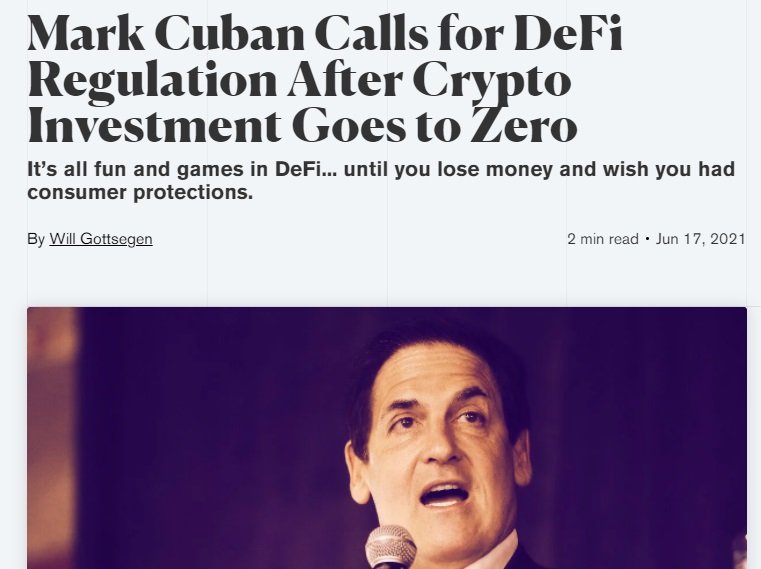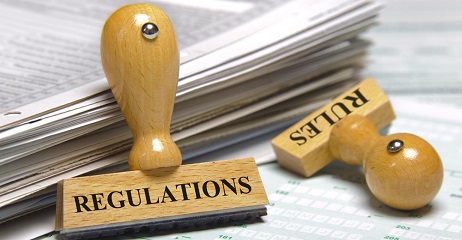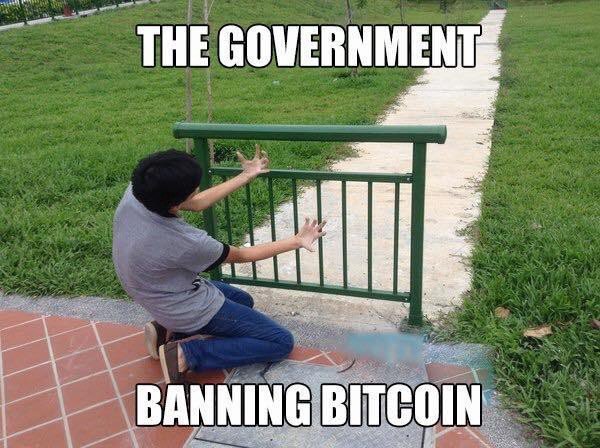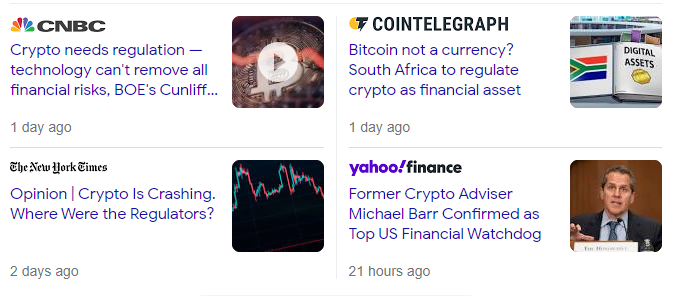
The regulation Boogieman!
With all kinds of crazy stuff happening like LUNA crashing to zero and Celsius halting withdrawals, it's easy to imagine regulators moving in and making a bad situation even worse. To which I would ask: HOW? How will they regulate crypto? They literally can't.
Notice now when everyone talks about regulation, they are EXTREMELY vague and just say things like, "The SEC is going to regulate." What? How?!? How are they going to regulate? What are they ACTUALLY going to do? Literally the only thing we've seen them do is slap companies with fines for issuing unregulated securities. That's THE ONLY THING THEY'VE DONE SO FAR. Think about it, what else can they do? They can't do shit. Crypto is a self-regulating system by design. The SEC can't control it on a technological level.
This becomes even more obvious when we realize the global scope of cryptocurrency and the interoperability of it all. As a self-regulating network, it is impossible for an outsider to pop in and start imposing their will on these networks. In the real world this is called an occupation (war). In the digital world it's impossible because you'd have to take control of every server that runs the code and then stop other servers from popping up.
Regulations are great and clear the playing field.
If something can be regulated... good: let it be regulated.
If it's not even decentralized enough to prevent regulations,
then it's not really worth pursuing in the first place.
Again, how will they regulate?
They've been threatening exchange like Coinbase that they need to KYC "self-hosted" wallet. You mean... wallets? Every wallet is self-hosted (by someone). Regulators inherently need centralized custodians in order to even do their jobs.
So one of the big plans for regulations is to KYC the wallets that Coinbase and the like transfer money to? First of all, it's not even feasible, and second of all, it's totally pointless.
Example 1
I transfer my crypto from Coinbase to a KYC wallet that has my ID attached to it. I transfer the crypto to another wallet that doesn't have KYC attached to it. Regulation defeated... with a single transfer. If we actually look at the real-world examples of "regulation" within crypto... it's a complete joke that doesn't accomplish anything
Example 2
I transfer money from Coinbase to another exchange. I literally can't KYC this wallet because I don't control it. Yet another place where regulations completely break down. Now it's up to the other exchange to provide the KYC info. Weird.

Look at me I'm a dumbass that lost all my money.
Can government do something?
Regulation regulation regulation
And yet we see over and over that people just keep generically screaming about regulations from the rooftops. Some are for "regulation". Some are against "regulation". You know what the common thread here is? "Regulation" doesn't mean anything. People just say "regulation" like it means something. It doesn't. These people are out of ideas. There are no regulations that can come into play.
Think about it.
Tell me the WORST CASE scenario. The worst kind of regulation you can possibly think of. I know someone is going to say something like, "well they could just ban crypto altogether". Yeah okay, they can't and that's also not regulation either. Try again. Also look what happens when things get banned (like drugs). The drugs increase in value exponentially on the black market. To think that could just automatically kill the technology that's going to take over the world in the next decade or two? Silly logic.
So tell me, how will they regulate crypto.
Long story short: they cannot. There is no form of regulation that can come in on the decentralized level. Regulations only work on centralized entities that can be served legal documents to the address where they are incorporated. That means, as it has always meant, that regulations comes down from the top-down at the banking level.

The banks.
Exchanges are the banks. Centralized exchanges can be regulated. Sure, fine, whatever. This was always the known outcome. But we also see instances where this isn't even true. Binance is sidestepping regulations constantly. I still have my Mandala account that's fully connected to all of Binance's security and liquidity pools and cloud coding. Even though Binance is not allowed to service my country, doesn't matter, I'm still using it. How's that for regulations? Binance is the biggest exchange in the world and they are gobbling up the small projects of note that are going bankrupt right now. They're only getting bigger.
Try and regulate me, Anon.
Even centralized projects can't be regulated if they build on decentralized architecture and simply stay anonymous. Again, there has to be an address; a door to knock on, to serve the legal papers. The entire foundation of the legal system is the threat of violence and the loss of freedom. It has no teeth without a target.
The DEXes
Things like Thorchain and RUNE are a huge development that goes largely unnoticed. Imagine what happens when they implement a privacy coin. Mainstream adoption rolls around and all of a sudden the regulators notice that people can just transfer money where ever they want anonymously. CEASE and DESIST, they'll say. Hm, no, I think we'll just keep going. The digital future is a lawless one in the beginning. Prepare yourselves.
P2P operations
The last bastion of regulation comes from turning crypto into fiat and fiat into crypto. However, even if this problem doesn't get solved, it eventually just goes away by itself once vendors accept crypto directly at the beginning of the mainstream adoption phase. If anyone can buy anything with crypto direct... doesn't really matter if there are heavy regulations on fiat/crypto trades, does it? These boundaries will eventually be completely shattered in a flood of adoption.
But also... I've been doing research on possible P2P operations that could happen right under the regulator's nose. In particular, I've been looking at Venmo. They only operate in the USA but Paypal is also expanding their crypto sector. On Venmo... you don't even need to KYC to use the app. You only need a phone. Of course if you want to deposit money from a regulated banked into your Venmo app, there's your KYC right there. But still I believe there are ways to avoid KYC inside of regulated spaces and implement p2p crypto/cash trades without even the regulators realizing what's going on. Such is the nature of decentralization.

Decentralization is impossible to regulate, and hard to track.
If I set up an operation of Venmo where I traded USD for crypto, I'd eventually get caught. Basically as I scaled up and pushed more volume through the app this would create a red flag. My account would be frozen and they'd ask me what was going on. Perhaps I could come up with a very convincing lie. Perhaps not. Eventually the party would be over.
However, If I created a system where a thousand different people are all sharing that burden of volume, it basically becomes impossible to track or stop. Sure, a few dozen people might get their accounts flagged or even banned. So what? There's still a thousand more people out there staying under the radar. That's the magic of decentralization. When money starts flowing in a centralized manner, it garners attention. When money flows in a decentralized p2p system... it's totally invisible and looks like all the other activity on the platform. Indistinguishable even. More on this in another post.
Conclusion
When people talk about crypto regulations, notice how they never talk about specifically what is actually going to happen. They use the word "regulation" like it's some magic trump card that's going to some how take over a self-governing network. I challenge everyone to ask: "What regulation?" What SPECIFIC thing are they ACTUALLY going to do?
Crickets.



